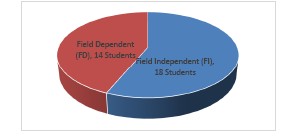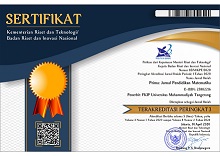
IDENTIFICATION OF STUDENT MISCONCEPTIONS BASED ON FIELD-DEPENDENT AND FIELD-INDEPENDENT COGNITIVE STYLES THROUGH THE JIGSAW LEARNING MODEL
Abstract
This study aims to identify students' misconceptions based on field-dependent (FD) and field-independent (FI) cognitive styles through the application of the Jigsaw learning model, particularly in mathematics learning. The research subjects consisted of 4 seventh-grade students at SMPN 1 Bolo, divided into FD and FI groups based on the results of the Group Embedded Figures Test (GEFT). The findings show that FD students had a higher misconception rate than FI students. A total of 35% of FD students experienced misconceptions. On the other hand, FI students had a lower percentage of misconceptions, at 15%. Applying the Jigsaw learning model successfully reduced misconceptions in both groups, especially among FI students, who are naturally more independent in processing information. However, FD students require additional intervention in the form of guidance and peer support to enhance their understanding. In conclusion, the Jigsaw learning model is effective in reducing misconceptions, particularly for FI students, but it still requires adaptations for FD students to achieve optimal results.
Full Text:
PDFDOI: http://dx.doi.org/10.31000/prima.v9i1.12710
Article Metrics
Abstract - 1520 PDF - 679Refbacks
- There are currently no refbacks.
Prima: Jurnal Pendidikan Matematika
Program Studi Pendidikan Matematika
Fakultas Keguruan dan Ilmu Pendidikan
Universitas Muhammadiyah Tangerang
Jl. Perintis Kemerdekaan I/33, Cikokol
Kota Tangerang, Indonesia
e-mail: primajpm@gmail.com
Prima: Jurnal Pendidikan Matematika (p-ISSN: 2579-9827 | e-ISSN: 2580-2216) is licensed under a Creative Commons Attribution 4.0 International License.







